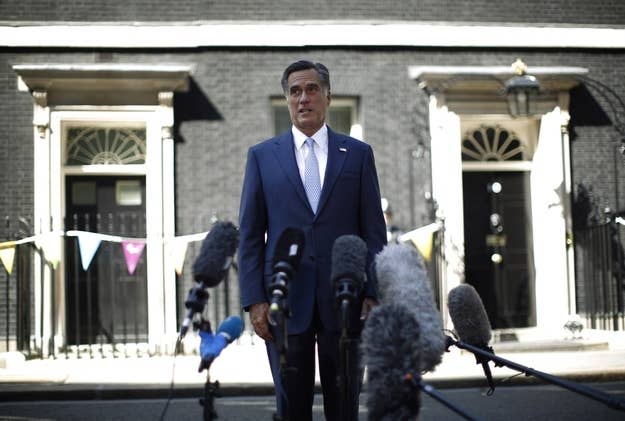
DULLES, Va. — As Mitt Romney finishes his second week of dismal news coverage — with slipping polls and a combustible international crisis driving the narrative that the campaign is flailing — the campaign's frustation with the media that covers it is approaching the boiling point.
Despite the usual sparring between press and campaign — and the occasional piece of red meat tossed to the conservative blogosphere — Romney and his senior aides had generally avoided the common Republican complaint that the mainstream media is fundamentally biased in favor of the Democratic Party. That has begun to change, however, with top aides now privately grumbling that they have given up the hope of a level media playing field.
"I love all these reporters saying that they thought the Democratic convention was better," said one senior adviser sarcastically. "Of course they did. It's like a steak lover saying they like a steak house. They served what 90 percent of reporters love. And they liked it? Shocking."
Officially, the campaign's response to the media's Romney-in-disarray storyline has been a cavalier shrug.
"Look, I know it exists, but it is neither a compelling message or an effective tactic," senior adviser Kevin Madden told BuzzFeed. "Instead, we just make sure to work hard, extra hard, to get the governor's message to voters. The voters are the ones who get to decide who wins this race. We remain focused on that task every day and we're confident in our mission."
But frustration is building behind the scenes, egged on by a conservative media and Twitter conversation that has blamed the media for accusing Romney of a premature response to the crises in Libya and Egypt.
The adviser, granted anonymity to criticize a press corps the campaign still relies on every day, went on to blame a "green room, green zone kind of divide," saying the national press, most of whom live in New York or DC, "pockets of prosperity," are isolated from the realities of the harsh economy — and therefore, unable to grasp Romney's message.
Instead, they are preoccupied by concerns akin to war reporters relaxing in the green zone: "Too much chlorine in the pool, the parties are going on too late, why can't we get the right flavors of Haagen Dazs? Most people aren't living in that world."
Another adviser expressed frustration with horserace reporters declaring Romney's campaign fatally behind, as President Obama pulls ahead in the polls. He said he suspects the press is projecting their own hopes for an Obama re-election at best — and purposefully cheerleading the incumbent, at worst.
"I mean, I was expecting this narrative in October," he said. "You know, the polls are close, and so the media starts cheering on their guy, saying Romney's doomed. But I didn't expect it to happen this early. They just seem really eager."
He singled out New York Times polling blogger Nate Silver — whose predictive model currently Obama an 80 percent change of re-election — as a left-leaning journalist who is churning out questionable analysis with partisan motives.
"It was kind of alarming when we found out that [Obama aide David] Axelrod was feeding him all this internal polling data and he wasn't disclosing it," the adviser said, referring to the 2008 election. (Silver acknowledged that he examined the Obama campaign's polling in that race, but said it didn't impact his objective analysis.)
Washington Post columnist Jennifer Rubin, a leading Romney defender with unique access to the campaign, has been pressing the biased-media message on her blog this week, suggesting reporters writing off the Republican's campaign "get a grip."
"There is a lot of thesis writing and not enough reporting," Rubin told BuzzFeed. "Ohio is in disarray! Anyone contact the campaign, check with local media, talk to people on the ground or independent pollsters, look at the 2008 exits, etc.? The ratio of quality reporting to hyped-up, unsubstantiated punditry is dangerously out of whack."
The complaints about a overhyped media narrative — as with most critiques of the press — have at least a kernel of validity. Since the conventions, Romney has been experiencing the short end of horserace political coverage: When polls start to go south, every gaffe is amplified, and every misstep becomes a data point.
But the Romney campaign has also given plenty of fodder to the media in recent days, including an incendiary response to the attacks on the Libya consulate and Egypt Embassy that received bipartisan blowback. And Romney was the beneficiary of this type of coverage at the beginning of the summer: When Obama was in a weaker-than-expected position in the polls, the press corps and pundits piled on.
Blaming the press is often a first reflex for campaigns eager to deny bad public polls and rally their supporters against a common enemy. Still, one plugged-in Republican who spoke with top advisers earlier this week, said the campaign's frustration with the press is unfeigned.
"Boston is a bit amazed," the Republican said. "Experienced political operatives say they've never seen the press be so unhinged and determined to write 'Republican in disarray' stories. Many conservatives concerned this is becoming a self-fulfilling prophesy are urging Boston to change the tone and the topic; they think the best way is to go on offense and be substantive, talk about the big issues."
